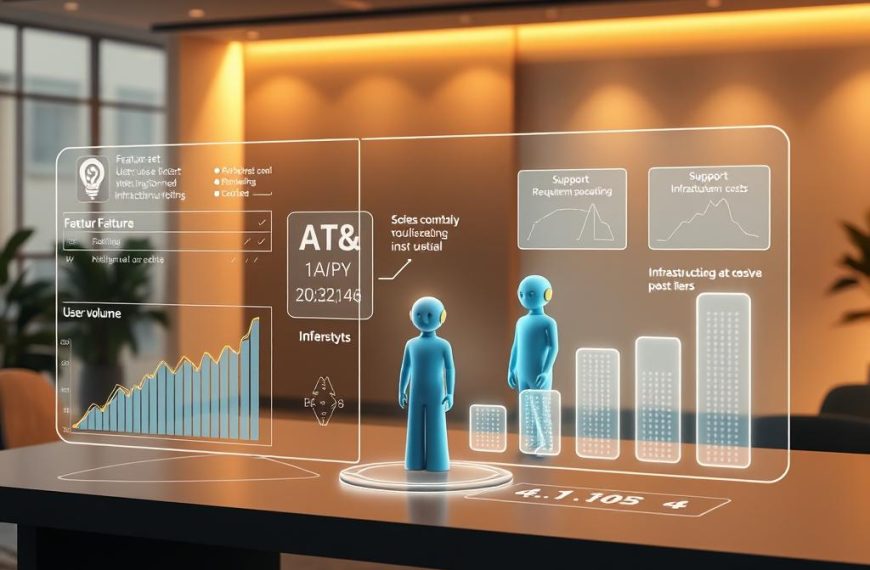Artificial intelligence is rapidly changing the business world. Recent AI advancements offer powerful tools for entrepreneurs to revolutionise their strategies. These breakthroughs demonstrate AI’s extraordinary potential for business growth.
The digital revolution now centres on AI. Research shows 61% of businesses plan to increase AI use in 2023. This signals a major shift in tech adoption across industries.
Innovative companies see AI as a critical edge. By strategically implementing AI solutions, businesses can unlock remarkable opportunities. These include improved efficiency, innovation, and growth.
AI tech is reshaping how organisations operate. It offers predictive analytics and automated customer service. Companies using these tools can boost productivity and reduce costs.
AI also enables more personalised customer experiences. The future favours businesses that effectively integrate AI technologies. With potential global economic impacts of £12.6 trillion by 2030, exploring AI’s potential is crucial.
Understanding the Evolution and Impact of AI in Modern Business
AI has transformed business approaches to technological innovation. From early chatbots to modern AI solutions, it represents a profound technological revolution. This journey has reshaped how companies harness cutting-edge tools.
AI’s business evolution began with ELIZA, a pioneering 1960s computer program. This early chatbot laid the groundwork for today’s sophisticated AI technologies. It paved the way for AI’s widespread use across industries.
Key Categories of AI Technology
Modern AI comprises several critical technological categories driving business transformation:
- Machine Learning: Processing vast datasets with unprecedented speed
- Deep Learning: Utilizing advanced neural networks for complex problem-solving
- Natural Language Processing: Enabling intelligent communication systems
- Robotics and Automation: Streamlining operational processes
- Generative AI: Creating novel content and solutions
Current State of AI Adoption
AI adoption trends show rapid integration across diverse sectors. Current statistics highlight the massive potential of AI technologies:
- 86% of executives consider AI a mainstream technology
- 72% of business leaders anticipate AI as a significant competitive advantage
- 63% of organizations report improved data analysis capabilities
These figures underscore AI’s transformative power in modern business landscapes. They reveal unprecedented opportunities for innovation and growth. AI continues to reshape how companies operate and compete.
How to Use AI to Grow Business: Essential Strategies
AI growth strategies are transforming traditional business models. The digital landscape now demands innovative approaches to using AI for expansion. This creates new opportunities for organisations embracing technological advancement.
Key AI strategies for business growth include:
- Data-Driven Decision Making: Leveraging AI to analyse complex datasets and generate actionable insights
- Predictive Analytics: Forecasting market trends and customer behaviours
- Process Automation: Streamlining repetitive tasks to enhance operational efficiency
- Personalised Customer Experiences: Tailoring interactions through intelligent algorithms
Organisations using AI technologies can gain significant competitive advantages. Recent research shows AI-powered tools help businesses in several ways.
- Reduce operational costs
- Improve customer engagement
- Accelerate innovation cycles
- Optimize resource allocation
Successful AI integration requires a strategic approach. Businesses must invest in robust data infrastructure. They should develop cross-departmental collaboration and foster continuous learning.
Identifying skill gaps and providing targeted training are crucial steps. These help in developing a comprehensive AI strategy.
AI is not just a technology upgrade; it’s a fundamental reimagining of business potential.
AI growth strategies can turn challenges into opportunities. They create agile, intelligent, and responsive business models. These models are well-prepared for future market dynamics.
Transforming Customer Experience with AI Solutions
AI is reshaping customer experience in the digital world. Businesses are using AI-powered tools to create better, more personal service. This new approach is changing how companies interact with their customers.
The numbers show AI’s big impact. Research says 65% of customer experience leaders see AI as vital. This shift is making businesses rethink how they engage with customers.

AI-Powered Customer Service Tools
AI is changing customer service with smart, 24/7 support. Here are some key facts:
- 68% of customers like how fast chatbots respond
- Businesses can cut service costs by 30% with AI virtual agents
- Generative AI helps staff serve customers more quickly
Personalisation and Customer Journey Optimisation
AI does more than basic tasks. It studies customer data to create hyper-personalised experiences. This means meeting each person’s needs exactly.
“AI allows us to understand customer preferences at an unprecedented depth, transforming generic interactions into meaningful connections.” – Customer Experience Expert
Predictive Analytics for Customer Behaviour
Predictive analytics gives new insights into customers. AI can now:
- Predict customer needs before they happen
- Spot risks of customers leaving
- Make smart staffing plans
| AI Capability | Business Impact |
|---|---|
| Sentiment Analysis | 98% Customer Satisfaction Potential |
| Predictive Support | 64% Reduced First Reply Time |
| Automated Triage | 220 Monthly Hours Saved |
By 2025, 80% of customer service groups will use generative AI. This will boost agent productivity and improve customer experiences. The future of customer service is smart, personal, and driven by AI.
Leveraging AI for Marketing and Sales Optimisation
AI is transforming digital marketing through sales optimisation. A 2023 PwC survey shows 81% of CMOs plan to use generative AI for new business models soon. This highlights AI’s growing importance in marketing strategies.
AI tools offer unmatched insights and efficiency in marketing and sales. Amazon and Starbucks showcase AI’s potential by enhancing customer engagement and retention.
- Automate repetitive marketing tasks
- Analyse vast amounts of customer data
- Create personalised marketing experiences
- Optimise ad targeting and spend
AI now creates compelling marketing copy and visual content. It also provides deep insights into customer behaviour. Platforms like Jasper and Copy.ai help craft tailored ad copy for specific audiences.
Predictive analytics is a game-changing AI application in marketing. It forecasts future trends and analyses historical data. This allows businesses to develop proactive strategies that anticipate customer needs.
AI is not just a tool, it’s a strategic partner in modern marketing.
AI in marketing improves efficiency and builds meaningful customer connections. It enables personalised email campaigns and intelligent chatbots for 24/7 support. This creates more responsive and engaging customer experiences.
Streamlining Operations Through AI Automation

AI automation is changing how businesses boost efficiency. It transforms complex workflows and boosts productivity. Intelligent tech reduces manual tasks, making operations smoother.
Administrative Task Automation
Businesses use AI to streamline admin processes. It cuts data entry errors by up to 90%. AI also automates repetitive paperwork tasks.
Technologies like OCR and NLP help process info faster. These AI tools are more accurate than old methods.
Process Efficiency Enhancement
AI-driven systems are changing operational workflows. They speed up decision-making and offer real-time data analysis. These systems also optimise how resources are used.
Companies using AI automation can boost efficiency by 20-30%. This gives them a big edge over competitors.
Cost Reduction Strategies
AI automation offers big savings. It can cut operational costs by 30% or more. It also reduces expenses from human errors.
AI lets staff focus on strategic tasks. By 2025, AI investments could yield over 300% ROI.
Addressing AI Implementation Challenges and Considerations
AI implementation challenges require strategic thinking and proactive approaches. Only 11% of risk managers feel confident assessing enterprise AI risks. This highlights the complexity of AI adoption considerations.
Businesses must develop robust strategies to overcome technological and organisational barriers. AI implementation challenges stem from multiple dimensions. With 94% of executives believing AI will transform industries, organisations face significant pressures.
Critically, 74% of companies struggle to capture value from their AI investments. This underscores the need for comprehensive implementation strategies. Successful AI adoption demands a multifaceted approach.
Organisations must invest in continuous learning programmes and prioritise data quality. Establishing clear security guidelines is crucial. Developing a culture of innovation can help demonstrate AI technology’s return on investment.
Businesses can unlock unprecedented potential by embracing AI challenges as growth opportunities. Tracking metrics like productivity and tool usage will enable organisations to refine their strategies. This approach will drive sustainable technological advancement.
FAQ
What is artificial intelligence (AI) and how can it benefit my business?
AI is a game-changing tech that allows machines to learn and adapt. It can boost efficiency, spark innovation, and automate complex tasks for businesses. AI unlocks new growth opportunities across various operational areas.
How can small businesses afford to implement AI technologies?
Many AI solutions are now accessible and scalable for businesses of all sizes. Cloud-based platforms and affordable subscription models make advanced tech available. Start with targeted implementations like customer service chatbots or marketing analytics tools.
What are the primary AI technologies businesses can leverage?
Key AI technologies include machine learning, natural language processing, and predictive analytics. Robotic process automation and computer vision are also important. These tools can improve business operations, from data analysis to customer engagement.
How does AI improve customer experience?
AI enhances customer experience through personalised interactions and 24/7 support via intelligent chatbots. It offers predictive recommendations and tailored marketing communications. AI helps businesses understand individual customer preferences and create more responsive engagement strategies.
What are the potential risks of implementing AI?
Potential risks include data privacy concerns, algorithmic bias, and integration challenges. Employee training needs and cybersecurity measures are also important considerations. A strategic approach and commitment to ethical AI implementation can help mitigate these risks.
Can AI help with cost reduction?
Yes, AI can significantly reduce operational costs by automating repetitive tasks. It optimises resource allocation and improves decision-making through advanced analytics. AI also minimises human error across various business processes.
How quickly can businesses see returns on AI investments?
Return on investment varies, but many businesses see improvements within 6-12 months. Start with targeted, high-impact applications that align with specific business objectives. Focus on solutions that demonstrate clear value.
Do I need advanced technical skills to implement AI?
Many modern AI platforms have user-friendly interfaces, making them accessible to non-experts. Businesses can start with plug-and-play solutions or partner with AI consultants. Deep technical knowledge isn’t always necessary for implementation.
How does AI support marketing and sales efforts?
AI revolutionises marketing and sales by enabling precise targeting and generating data-driven insights. It automates content creation and predicts customer behaviours. AI also personalises customer journeys across multiple touchpoints.
What industries are most successfully using AI?
AI is transforming numerous sectors, with technology, finance, and healthcare leading the way. Retail, manufacturing, and customer service are also notable early adopters. Each industry finds unique applications that drive efficiency and competitive advantage.














